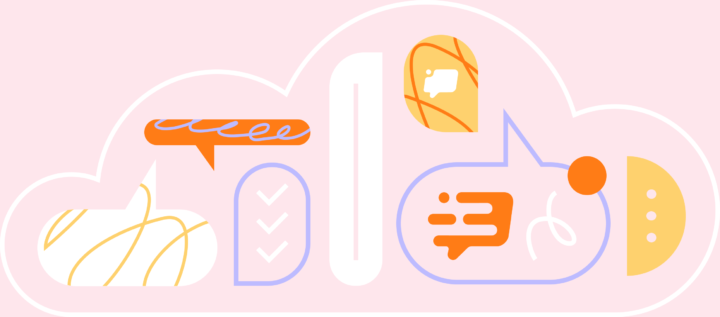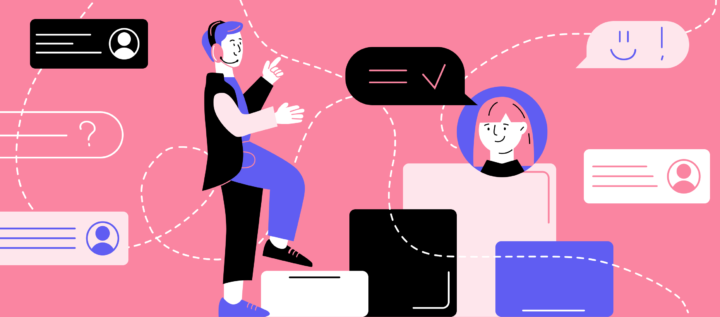Ultimate guide to an AI sales funnel: the best tips, tools and common mistakes to avoid

Are you looking for ways to fix bottlenecks in your sales funnel and make your team more effective? You’re not alone. An AI sales funnel can become an answer to your questions.
In this article, we’ll explore how to build and optimize AI sales funnels, breaking down key tasks AI can assist with, implementation strategies, and essential tools to elevate your sales process.
Ready to transform your approach? Let’s dive in! 🌊
What’s an AI sales funnel
An AI sales funnel elevates traditional funnel stages — Awareness, Interest, Consideration, Evaluation, and Purchase — by empowering your marketing and sales teams with AI.
Let’s consider a typical funnel and see how AI can power you up at each stage 👇
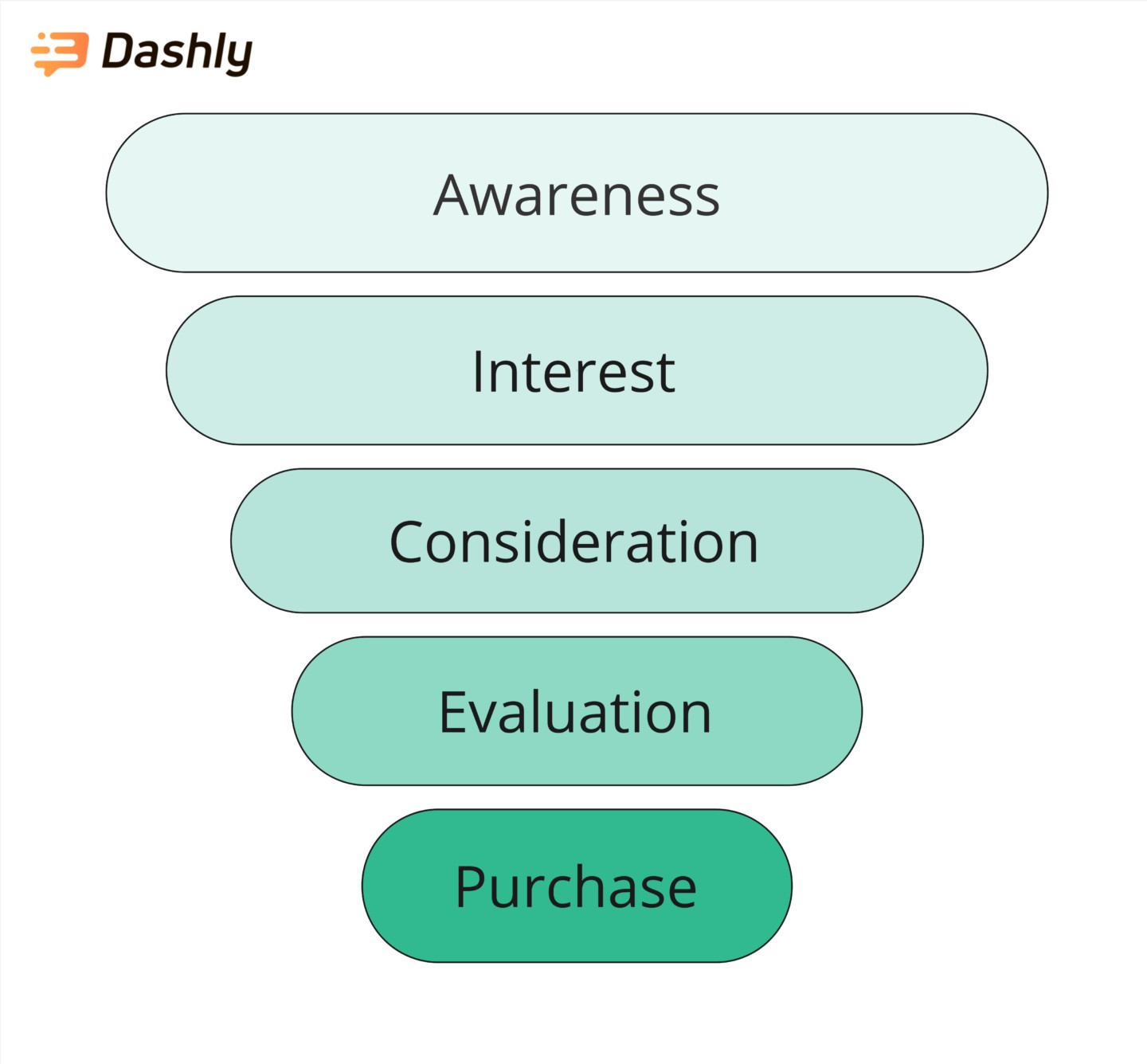
Awareness
Here, AI aids in pinpointing the right audience, using data to enhance targeting strategies. This ensures marketing efforts are aimed at high-potential leads, boosting outreach effectiveness.
Interest
During the Interest phase, AI analyzes user behavior to help sales reps craft personalized communication and content. It offers insights into what resonates with prospects, enabling tailored messaging that captures attention.
Consideration
In this stage, AI supports sales teams by scoring leads and recommending personalized solutions. It identifies prospect needs, allowing reps to focus on high-potential leads and present offers more persuasively, focusing on particular tasks or pain point a lead has.
Evaluation
AI streamlines decision-making by predicting outcomes and suggesting optimal offers, helping sales reps handle objections and guide prospects towards favorable decisions.
Purchase
Finally, at the Purchase stage, AI assists in simplifying the transaction process. It predicts customer preferences, enabling sales reps to close deals faster and more efficiently.
By integrating sales funnel AI, you amplify the impact of your teams, making every stage smarter and more effective.
Benefits of AI sales funnels
Incorporating AI sales funnels into your business strategy can yield significant advantages. Let’s consider five key benefits of using artificial intelligence to enhance your sales funnel 👇
Improved lead targeting
With AI, businesses can analyze vast amounts of data swiftly to identify and target high-potential leads. Artificial intelligence processes information such as user behavior, demographics, and past interactions to help sales teams focus their efforts on the most promising prospects, ensuring that marketing resources are used efficiently.
Personalized customer interactions
AI sales solutions enable personalized communication at every stage of the sales funnel. By analyzing user preferences and behavior patterns, AI provides sales reps with insights to tailor messaging and content. This level of personalization enhances the customer experience, increases engagement, and ultimately boosts conversion rates.
Efficient sales processes
AI sales funnels streamline the entire sales process. With AI tools you can get rid of repetitive tasks, such as sending follow-up emails and scheduling meetings. This way, your sales reps will focus on strategic tasks. This increased efficiency not only saves time but also leads to faster deal closures.
Enhanced decision-making
Artificial intelligence also assists in making data-driven decisions. By providing insights into trends and customer behavior, AI helps sales teams predict customer needs and preferences. This predictive capability allows businesses to craft well-informed strategies and adjust their sales funnel quickly, boosting overall effectiveness.
Higher conversion rates
Ultimately, the integration of AI into your automated sales funnel leads to higher conversion rates. By optimizing each stage — from targeting to closing — AI sales funnels ensure that interactions are meaningful and efficient. This not only improves the bottom line but also strengthens customer relationships, creating loyal brand advocates.
As you see, embracing artificial intelligence in your sales funnel can transform the way your team works. By leveraging the power of AI sales, companies can achieve greater efficiency, personalization, and success in their sales processes.
Tasks AI can cover for your sales team
We keep talking about AI being a gamechanger for your business. But let’s specify. Here are 10 tasks that AI can automate and accelerate, adding value to your sales team through AI sales strategies.
Lead scoring
AI analyzes data to automatically score leads based on their likelihood to convert. This prioritization allows sales teams to focus on high-value leads, ensuring efforts are directed where they matter most. It streamlines the AI funnel process by refining lead qualification, thus optimizing resource allocation and maximizing productivity.
Here you can check out the scoring process by Dashly 👇
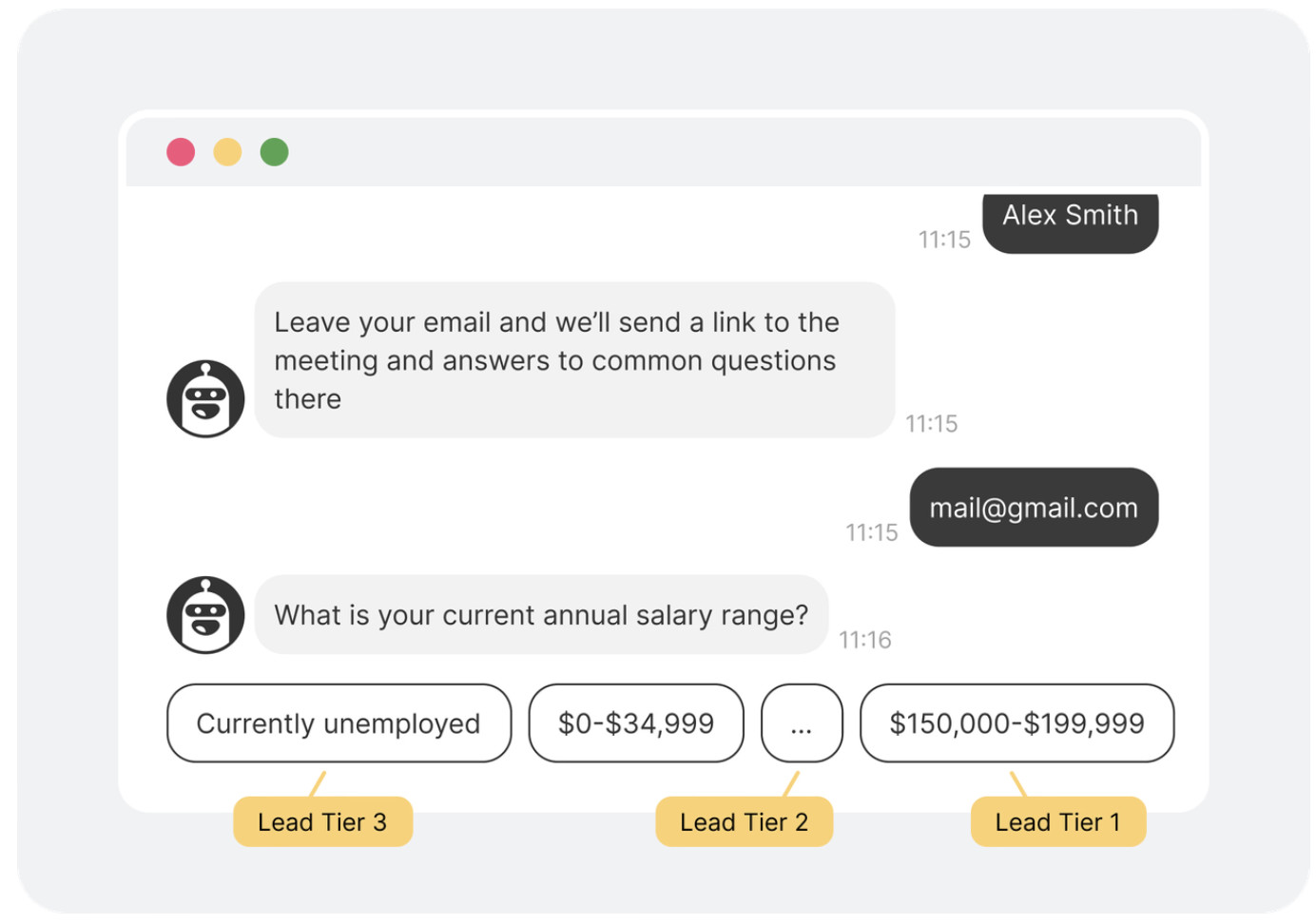
Personalized email campaigns
With AI-powered funnels, you can automate and tailor email campaigns that resonate individually with each prospect. By analyzing past interactions and preferences, AI crafts personalized messages aimed at increasing engagement and nurturing relationships.
After qualifying a lead, Dashly’s AI sales assistant uses collected data to craft personalized messages and provide value in each email, nurturing leads and raising conversion to a meeting.
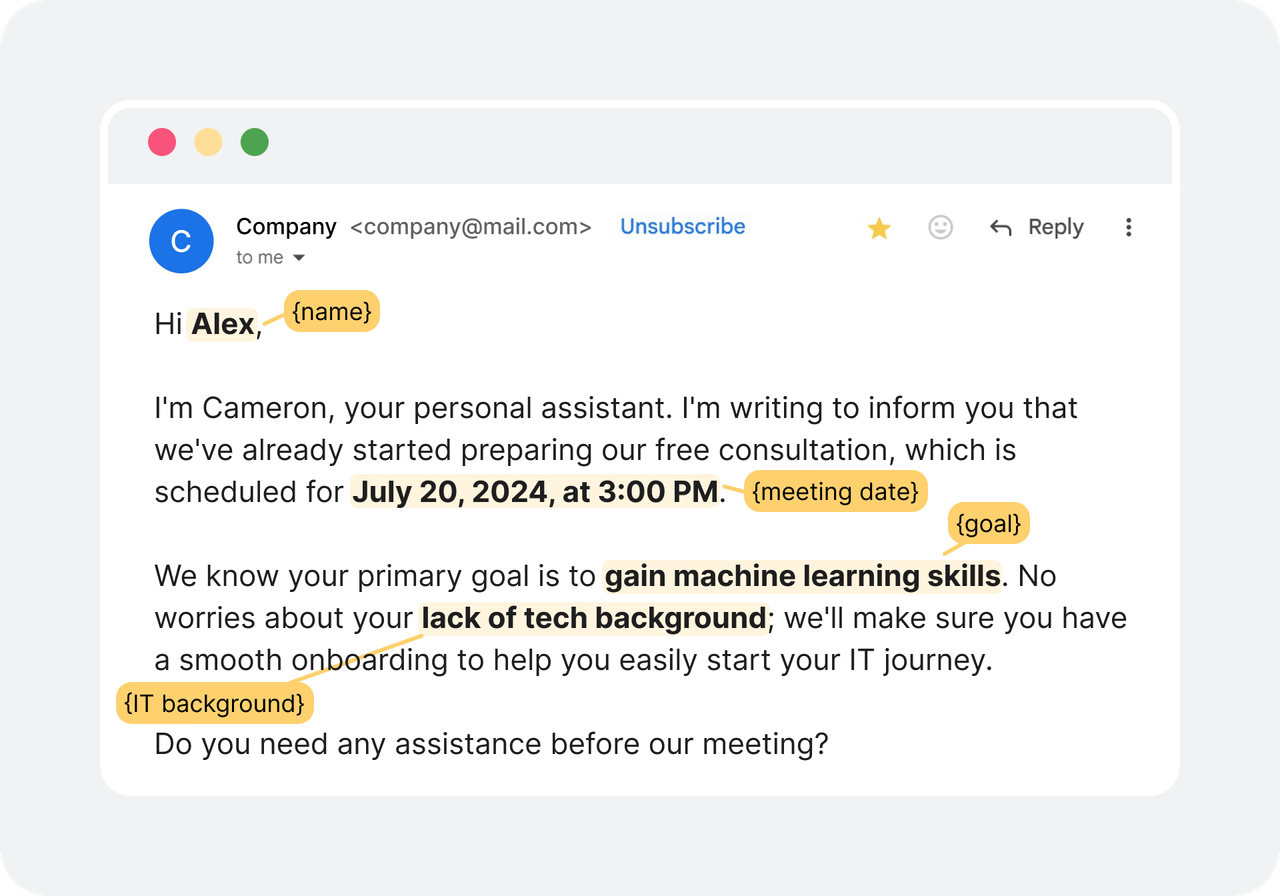
Double your SaaS sales funnel conversion with Dashly AI
⭐ Engage prospects with conversational quiz
⭐ Reach out in their preferrable channel
⭐ Automate lead nurturing with personalized AI sequences
Proactive engagement
GPT funnels employ chatbots to engage website visitors in real-time. These bots can answer FAQs, qualify leads, and guide visitors down the AI sales funnel. By handling initial queries and providing immediate responses, chatbots ensure no potential customer is ignored, enhancing user experience and capturing leads effectively.
And your funnel works effectively 24/7.
Predictive sales analytics
AI offers predictive insights, guiding sales strategies by analyzing trends and customer behaviors. This capability allows teams to anticipate future needs, adjust their approaches, and focus on high-potential opportunities. By implementing predictive analytics, businesses can optimize their sales funnel for enhanced decision-making and strategizing.
Meeting scheduling
AI tools automate the process of scheduling appointments and demos, coordinating times that suit both sales reps and prospects. This reduces the back-and-forth usually involved in setting meetings, freeing up valuable time and allowing the team to focus on more strategic tasks.
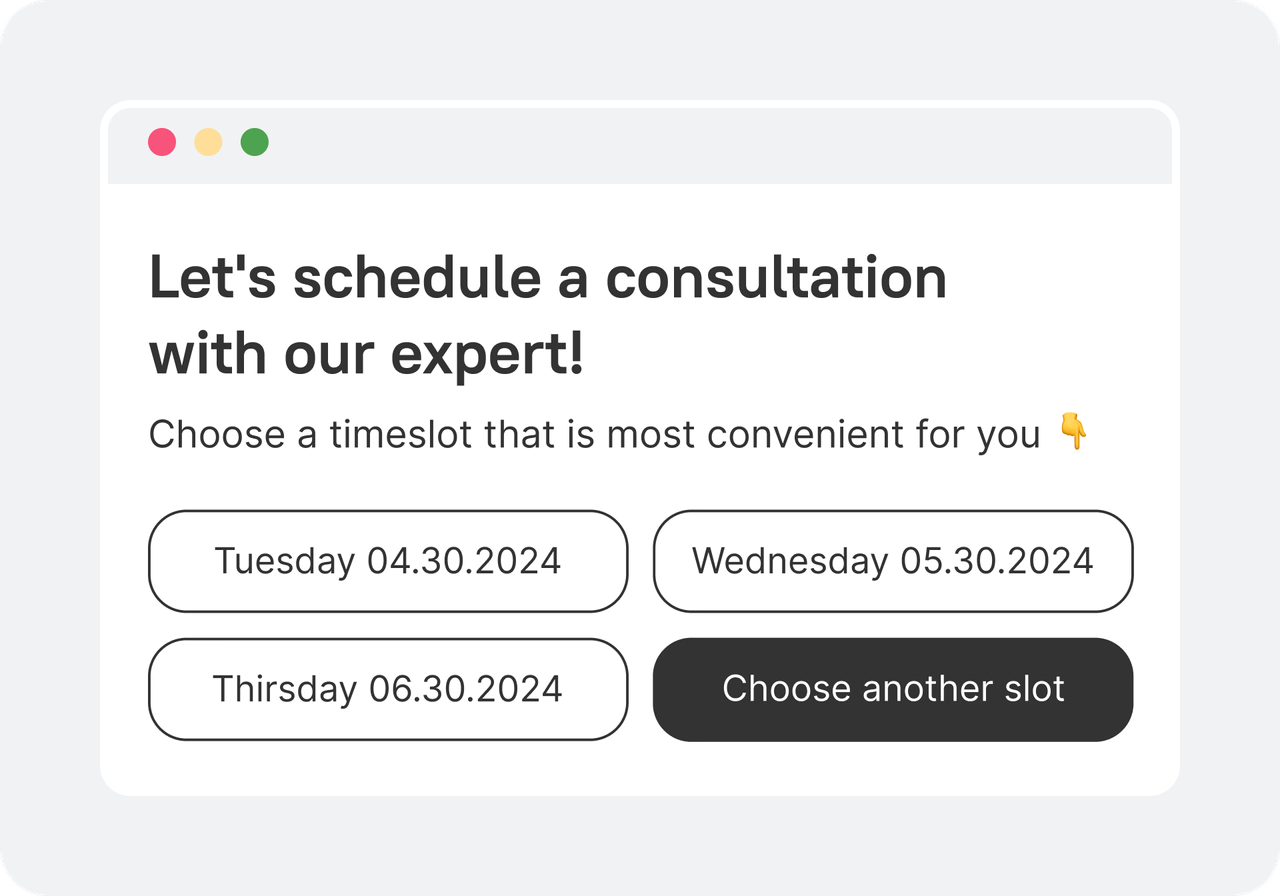
Data entry and management
Automate tedious data entry tasks with AI solutions that capture and organize information seamlessly. By minimizing manual entry, this automation reduces errors and liberates the sales team to concentrate on critical activities within the AI-powered sales funnel.
Accurate sales funnel management is crucial for informed decision-making and strategy development. And now you don’t have to waste your precious time on it 😉
Customer segmentation
AI-powered funnels excel at segmenting customers based on specific criteria such as behavior, preferences, and past purchases. This segmentation allows sales teams to tailor their strategies to different customer groups, providing more effective targeting and personalized engagement. Such precision enhances marketing effectiveness and conversion rates.
Sales forecasting
AI analyzes historical data and current trends to provide accurate sales forecasts. By understanding what the future may hold, teams can plan strategically, allocate resources effectively, and set realistic targets. Sales forecasting empowers businesses to navigate market fluctuations with confidence.
Competitive analysis
AI tools gather and analyze competitor data, offering insights into market positioning and industry trends. This information helps sales teams refine their strategies and differentiate themselves in a competitive landscape. By understanding competitors’ strengths and weaknesses, businesses can craft strategic initiatives that deliver a competitive edge.
Post-sale follow-ups
GPT funnels automate post-sale communications, ensuring customers feel valued and supported. These AI-driven follow-ups can gather feedback, offer additional resources, and encourage repeat business, strengthening customer relationships. Personalized follow-ups reinforce loyalty and enhance customer retention.
Implementing these AI tasks into your sales strategy can lead to increased efficiency, optimized targeting, and higher conversion rates. By automating routine tasks, AI empowers your sales team to focus on building relationships and closing deals, driving business growth.
This shift from manual processes to AI-powered sales funnels not only boosts productivity but also enables innovation, positioning your team at the forefront of the sales process. In a rapidly evolving market, leveraging AI technology is not just an advantage; it’s essential for maintaining competitiveness and achieving long-term success.
And since you’re totally caught on AI and can’t wait to test it, let’s figure out how to set up an AI-powered sales funnel 👇
How to start implementing AI in your funnel
Here’s a five-step guide on incorporating artificial intelligence into your sales funnel.
Step 1: Identify your needs
Begin by assessing your current sales process to determine which areas could benefit most from AI introduction.
Common areas include lead scoring, personalized customer interactions, and forecasting. Identify specific goals for each stage of your sales funnel with AI, such as improving conversion rates or reducing time spent on repetitive tasks.
Understanding why and where you need automation will help tailor your approach and maximize the benefits of your new tools.
Step 2: Choose the right AI tools
Selecting the right AI tools and technologies is crucial. What exactly are you looking for, chatbots, CRM integrations, or predictive analytics software?
Look for solutions that easily integrate with your existing systems to ensure a smooth transition. Also, consider AI solutions that offer versatility across different stages of your AI sales funnel, enabling customer segmentation, sales funnel analysis, and predictive modeling.
Doing thorough research on available tools and seeking recommendations can greatly assist in making informed decisions.
Step 3: Train your team
Educate your sales team about the benefits and functionalities of an AI-powered sales funnel.
Training should cover how to use new AI tools effectively and integrate them into daily activities. Encourage your team to view AI as a partnership that enhances their abilities, not a replacement. Establish a culture of continual learning and adaptability to keep pace with evolving AI technologies and methodologies.
Step 4: Implement gradually
Start by integrating AI in one specific area of your sales funnel to minimize disruption. Focus on areas that offer the quickest wins or that solve pressing pain points. Pilot programs can help test and refine your approach before full-scale implementation.
Use initial results to make necessary adjustments and build buy-in from your team. Encourage feedback and maintain an open dialogue to address any challenges that arise during the roll-out.
Step 5: Monitor and iterate
Continuously monitor the performance of your AI funnels. Analyze key metrics such as conversion rates, lead quality, and customer feedback to assess the impact of AI integration on your sales funnel.
Use this data to iterate and refine your strategies, ensuring the tools are delivering the desired results.
Establish KPIs to measure success and adjust tactics as necessary, always seeking to improve and optimize your sales operations.
Challenges and mistakes to avoid
Of course, implementing AI in your sales funnel comes with challenges. Here are some potential pitfalls and how to avoid them:
Over-reliance on AI: While AI can handle many tasks, don’t underestimate the importance of human intuition and relationship-building. Balance AI integration with personal touches in customer interactions. Ensuring your team maintains strong customer relationships is essential to success. Again, AI’s not here to replace them but rather assist.
Ignoring data quality: Poor data quality can lead to incorrect predictions and insights, undermining your AI-powered sales funnel. Implement robust data management practices to ensure data is clean, accurate, and regularly updated. Investing in data quality will pay dividends when leveraging AI.
Lack of clear objectives: Implementing artificial intelligence without clear goals can lead to wasted resources and efforts. Establish specific, measurable objectives for what you hope to achieve with AI sales tools. Regularly review these objectives to ensure progress is being made and to recalibrate as necessary.
Insufficient training: Failing to adequately train your team on how to use AI tools can lead to underutilization. Invest time in comprehensive training and ongoing support to maximize your investment. Create resources and support networks to aid your team in effectively utilizing AI solutions.
Neglecting customer experience: Ensure that AI interactions enhance the customer experience rather than hinder it. AI is meant to keep communication personalized, relevant and in-time. Regularly solicit customer feedback to refine and enhance AI interactions.
By carefully planning and executing your AI integration, you can transform your sales funnel into an effective and efficient AI funnel.
Embrace the opportunities presented by artificial intelligence to optimize your sales processes, increase conversions, and deliver exceptional customer experiences.
AI tools to power up your sales funnel
Incorporating AI tools into your sales strategy can significantly enhance your AI sales funnel, increasing efficiency and boosting conversion rates. Here’s a breakdown of 10 AI sales funnel software that can be invaluable for various tasks in the sales process.
Dashly
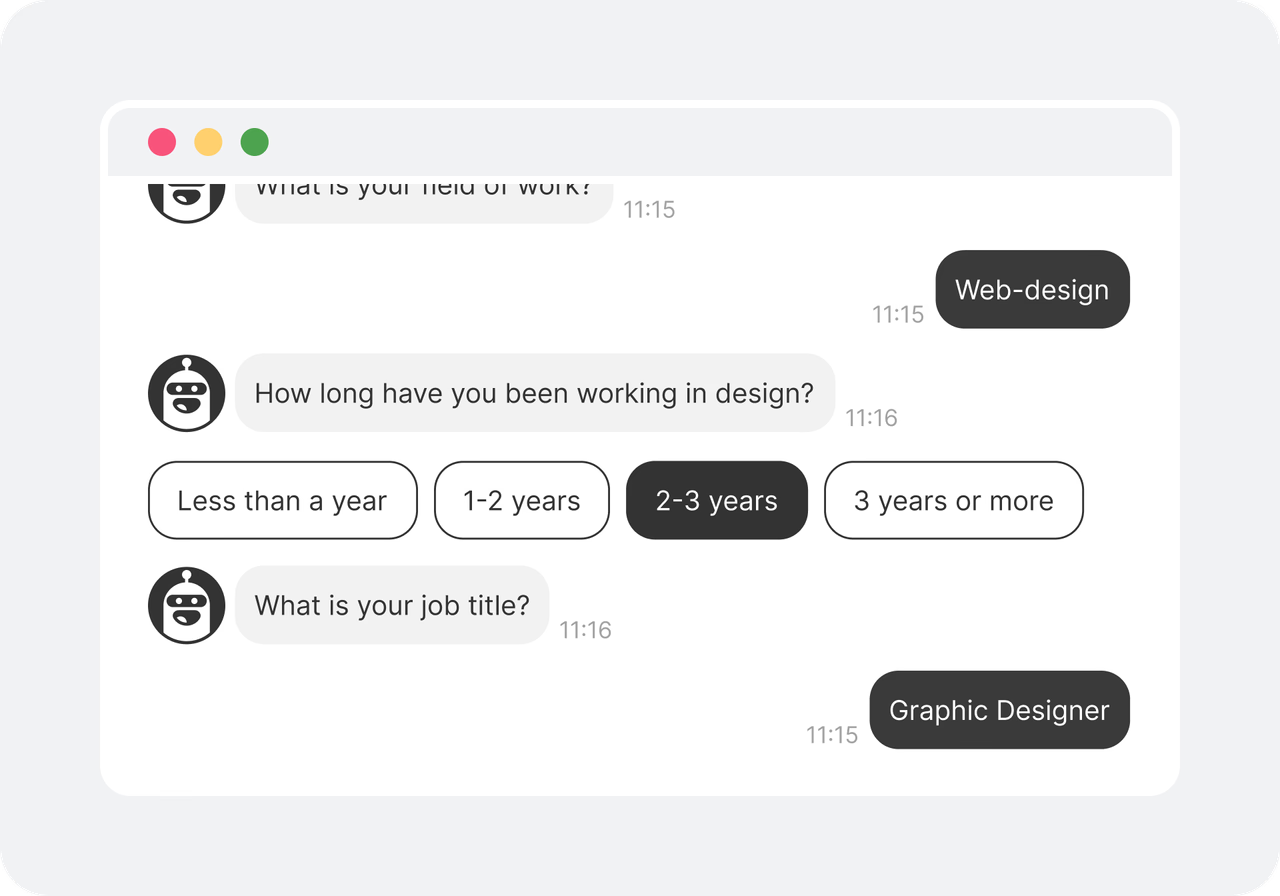

Dashly is a Conversation AI platform designed to empower your inbound funnel by managing the SDR process and ensuring more demo calls. It excels in lead qualification, meeting scheduling, and nurturing, streamlining the journey from prospect to client.
Tasks it covers
- Lead qualification
- Meeting scheduling
- Lead nurturing
- Demo call optimization
Double your SaaS sales funnel conversion with Dashly AI
⭐ Engage prospects with conversational quiz
⭐ Reach out in their preferrable channel
⭐ Automate lead nurturing with personalized AI sequences
HubSpot
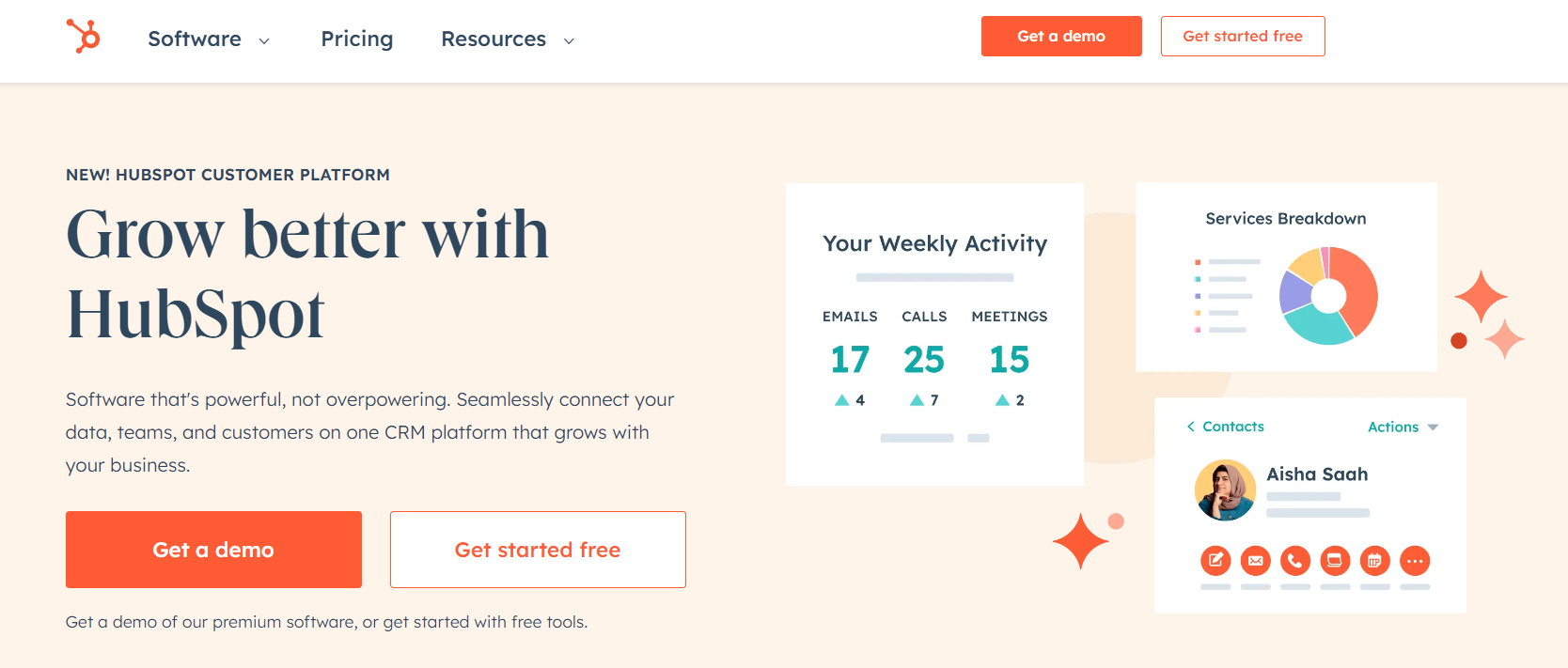
HubSpot integrates AI-driven solutions to enhance your CRM, offering marketing automation, lead management, and data analytics. Its robust features help attract, engage, and satisfy customers, ensuring an efficient AI funnel.
Tasks it covers
- CRM integration
- Marketing automation
- Data analytics
- Lead management
Apollo
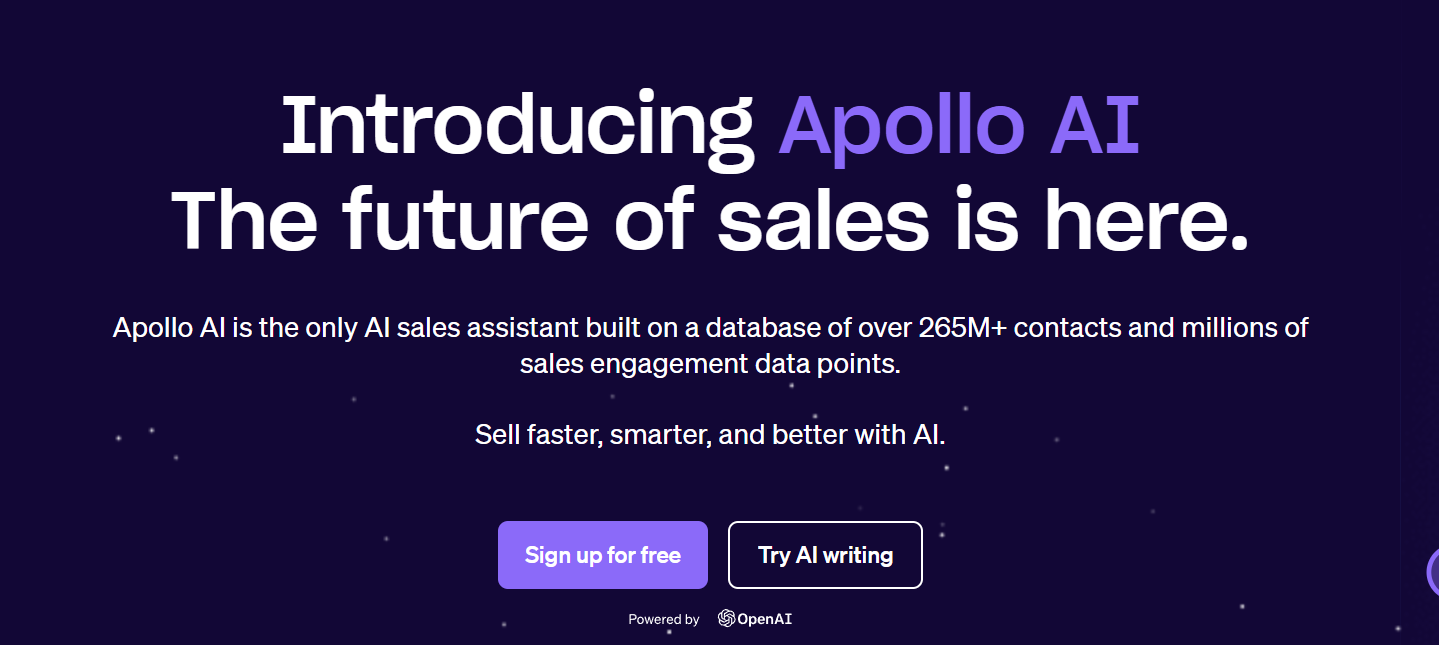
Apollo.io is a comprehensive platform that helps identify potential leads and enrich your CRM with valuable information. It enables precise targeting and personalized outreach, facilitating efficient AI sales funnels.
Tasks it covers
- Lead identification
- CRM enrichment
- Targeting and segmentation
- Personalized outreach
Gong
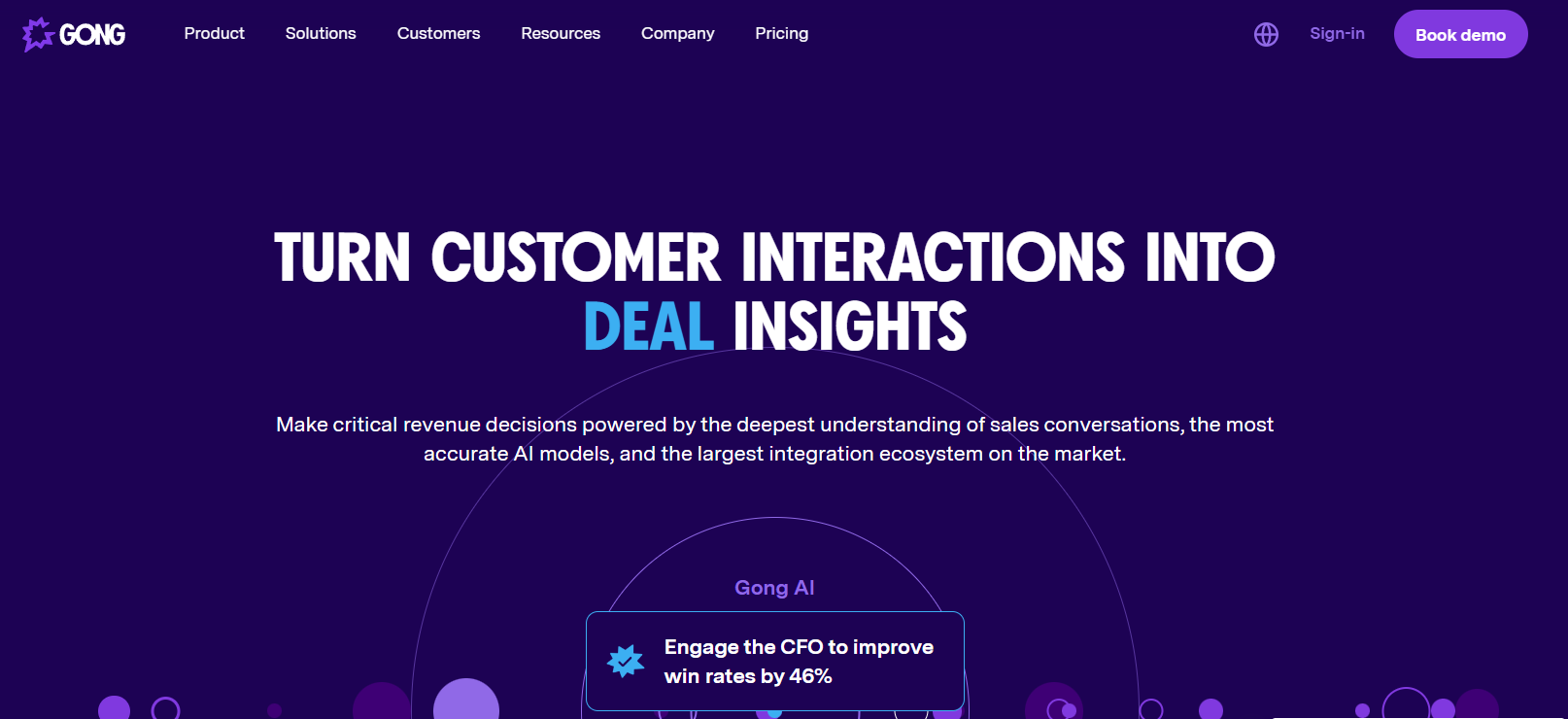
Gong utilizes AI to analyze sales calls, providing actionable insights to improve team performance. It records and transcribes conversations, highlighting key areas for improvement and coaching.
Tasks it covers
- Call analysis and transcription
- Sales performance insights
- Identifying areas for improvement
- Coaching suggestions
Fireflies.ai
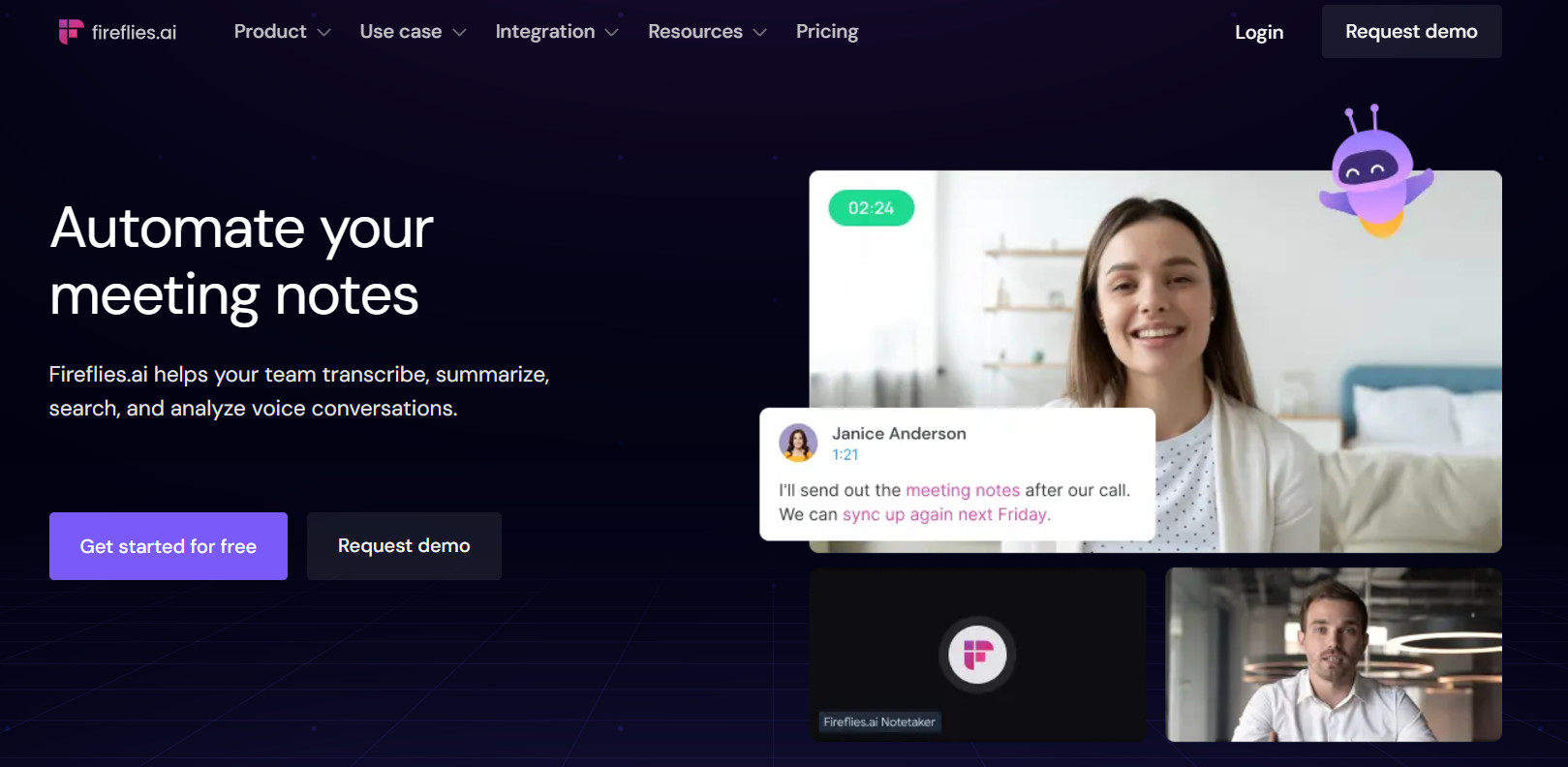
Fireflies.ai automates meeting note-taking and transcription, capturing key insights from sales calls. It integrates with various platforms, streamlining the documentation process and enhancing the sales strategy.
Tasks it covers
- Meeting transcription
- Note-taking automation
- Integration with call platforms
- Insight capture
6sense
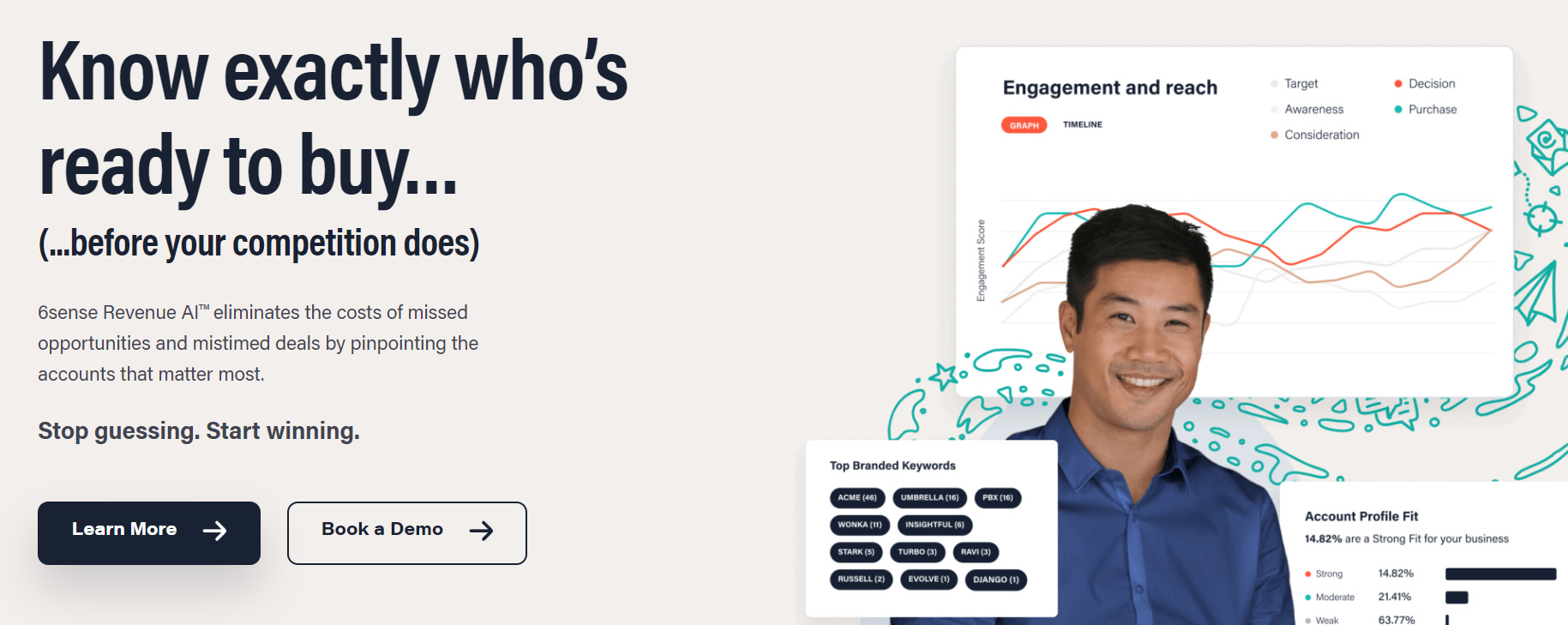
6sense leverages AI to offer predictive insights into the buyer journey. By identifying potential buying signals, it helps prioritize high-value leads and optimize engagement strategies within your AI funnel.
Tasks it covers
- Buyer journey insights
- Predictive lead scoring
- Engagement optimization
- High-value lead prioritization
Zia by Zoho
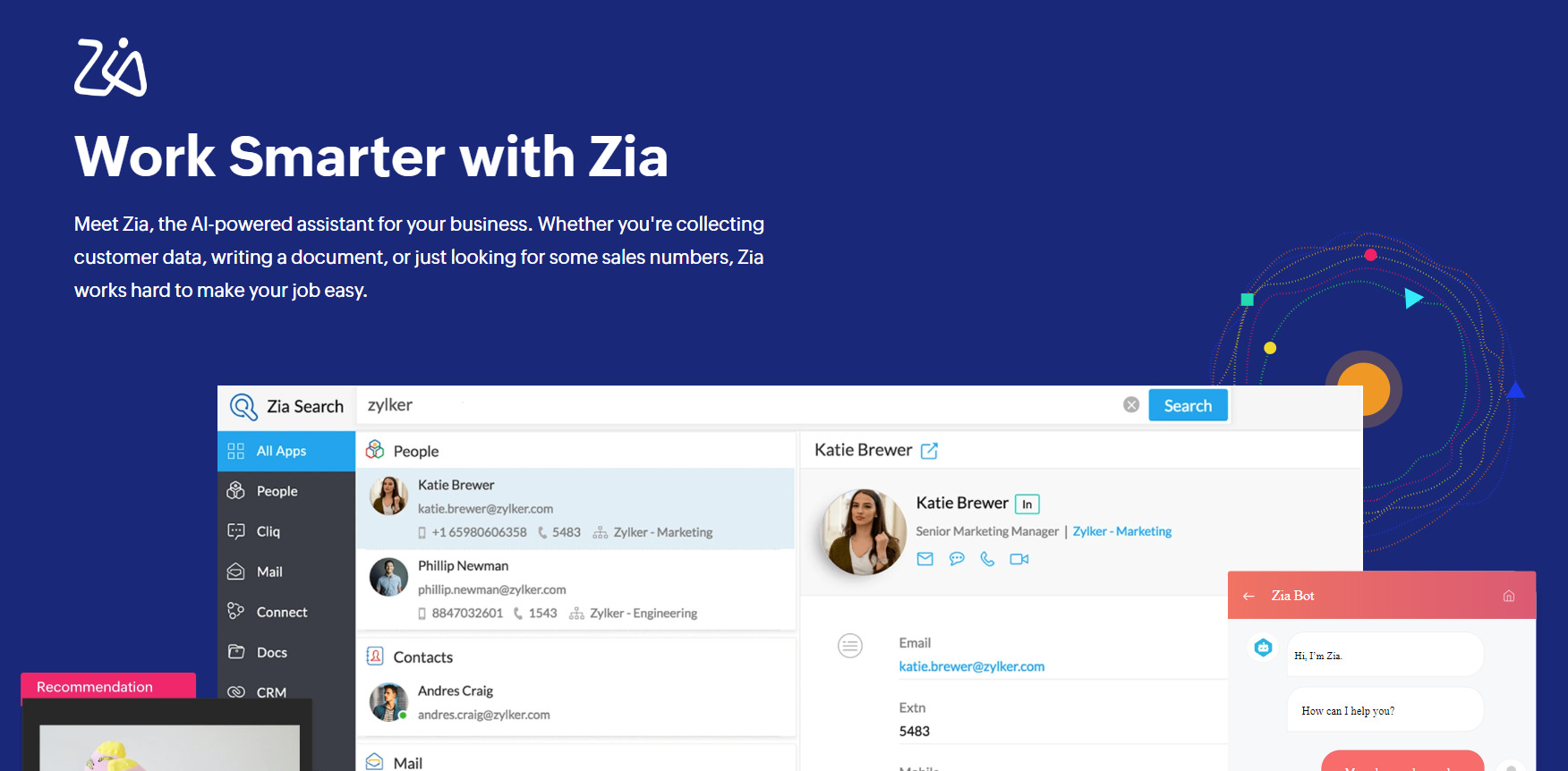
Zia is Zoho’s intelligent AI assistant, analyzing sales data to provide insights and predictions. It aids in automating repetitive tasks and identifying sales opportunities within the AI-powered funnels.
Tasks it covers
- Data analysis and insights
- Task automation
- Sales opportunity identification
- Predictive analytics
Salesforce’s Einstein
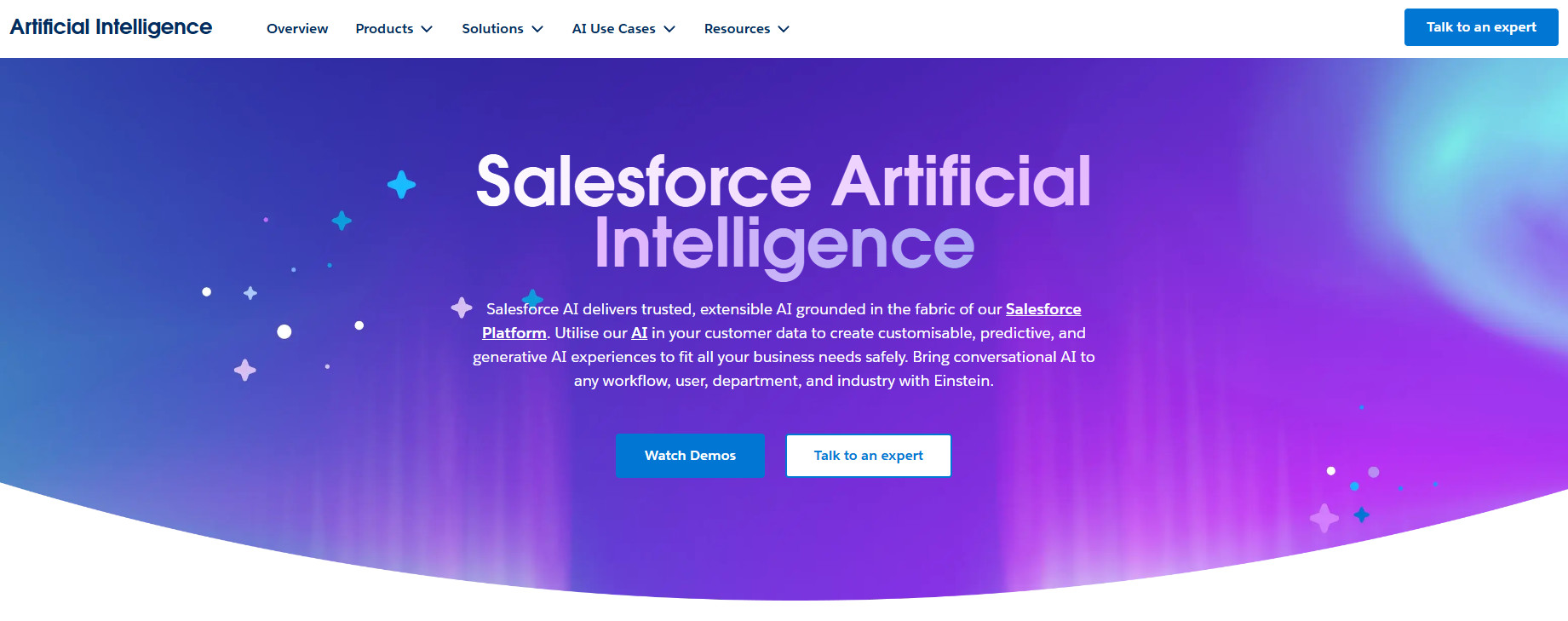
Salesforce Einstein leverages AI to provide insights across the Salesforce CRM platform. It automates tasks, analyzes data, and predicts customer behavior for more effective sales strategies.
Tasks it covers
- Salesforce CRM integration
- Data analysis and predictions
- Task automation
- Customer behavior insights
Hoppy Copy
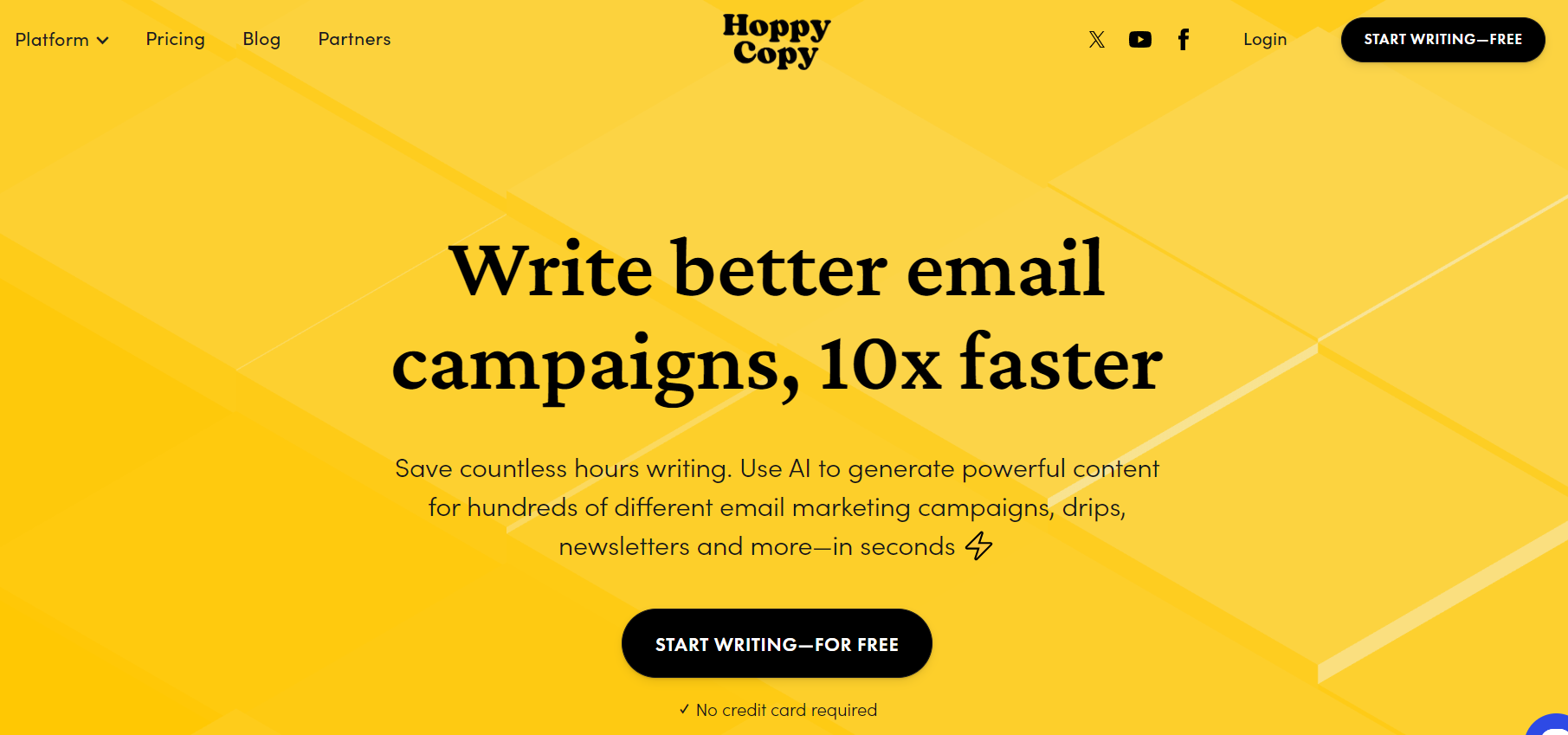
Hoppy Copy uses AI to generate compelling sales copy, including emails and ads, tailored to engage prospects effectively. It streamlines the creation of content that resonates with target audiences, facilitating smoother AI sales funnels.
Tasks it covers
- Sales copy generation
- Email and ad creation
- Engaging content
- Target audience alignment
Sendspark
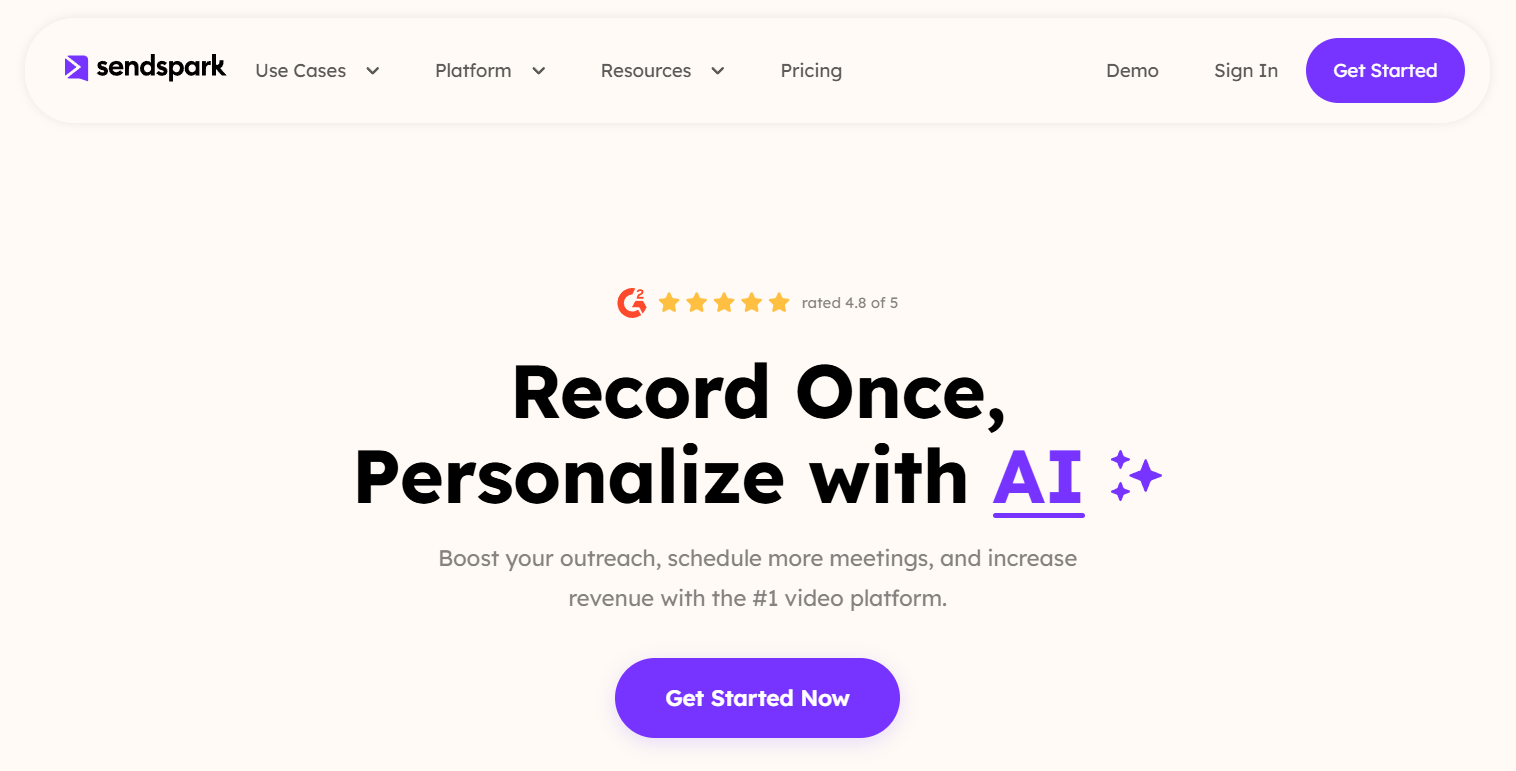
Sendspark enhances personalized video messaging for customer engagement. It allows sales reps to send customized videos, maintaining a personal touch and improving user interaction in AI sales funnels.
Tasks it covers
- Personalized video messages
- Customer engagement
- Maintaining personal touch
- Improving interaction
These AI tools offer a diverse range of functionalities that can transform your AI sales funnel into a more efficient and effective system.
Automation provided by AI solutions like Dashly and HubSpot enables companies to streamline processes and improve engagement. HubSpot’s marketing automation and CRM features complement Dashly’s conversational capabilities, creating a comprehensive approach to managing leads through an AI funnel.
AI-driven insights from tools like Gong and Fireflies.ai provide a deeper understanding of team performance and customer interactions. By leveraging these insights, sales teams can refine their approach, honing in on what works and addressing areas for improvement.
Predictive analytics from 6sense and Zia by Zoho empower sales teams with foresight, allowing them to prioritize prospects likely to convert and tailor their strategies accordingly.
Meanwhile, creative tools like Hoppy Copy and Sendspark ensure that engagement remains personalized and impactful. Custom content that resonates with audiences can make a significant difference in conversion rates, helping sales reps forge stronger connections.
Ultimately, embracing these AI solutions will help you build robust AI-powered funnels that integrate the power of artificial intelligence seamlessly into your sales processes.
By leveraging the capabilities of AI, you’ll not only streamline operations but also enhance the quality of customer interactions, driving higher conversion rates and boosting overall sales performance.
Wrapping up
An AI-powered sales funnel can transform the way your team operates by automating routine tasks and enabling your talent to focus on strategic, high-impact work.
Implementing an AI funnel streamlines operations, optimizes customer engagement, and enhances overall efficiency. This empowers your sales team to respond swiftly to leads, personalize interactions, and drive conversions.
By embracing these AI technologies, you’re not only boosting productivity but also fostering innovation and growth within your organization.
The future of sales lies in the seamless integration of AI.
Start your own journey with Dashly 👇
Double your SaaS sales funnel conversion with Dashly AI
⭐ Engage prospects with conversational quiz
⭐ Reach out in their preferrable channel
⭐ Automate lead nurturing with personalized AI sequences
FAQ on Artificial Intelligence in sales
An AI sales funnel integrates artificial intelligence into traditional sales processes to enhance efficiency and effectiveness. By leveraging AI, businesses can automate routine tasks, personalize customer interactions, and optimize the funnel for higher conversion rates. AI tools provide insights and automation that streamline each stage, from lead generation to closing deals.
AI improves a sales funnel by automating tasks such as lead scoring, email personalization, and follow-ups. This reduces manual workload and allows sales teams to focus on strategic tasks. With an AI-powered sales funnel, businesses can analyze data more accurately, anticipate customer needs, and engage prospects with targeted communication, resulting in higher conversions.
AI can automate numerous tasks within a sales funnel, including lead scoring, personalized email campaigns, chatbots for initial engagement, predictive analytics, meeting scheduling, and data management. These AI funnels enhance efficiency by reducing manual processes and improving data accuracy.
While an AI-powered sales funnel offers significant benefits, suitability depends on a business’s needs and resources. Smaller companies may start with basic AI tools and scale as they grow, while larger organizations might implement comprehensive AI solutions. Assessing specific goals and capabilities is crucial to determine the right AI strategy for your business.
Challenges include ensuring data quality, aligning AI tools with existing systems, and adequately training the sales team. Businesses must also avoid over-reliance on AI, maintaining a balance between automated processes and human interaction. Addressing these challenges involves thoughtful planning and ongoing support.
Success can be measured by tracking key metrics such as conversion rates, lead response times, customer satisfaction scores, and overall sales growth. By analyzing these metrics, businesses can assess the impact of AI on their sales funnel and make informed adjustments to improve performance.



